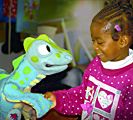Teacher Resources and Support Strategies for Overwhelmed Educators

Check out our blog for social-emotional learning articles, news, and more!
 Objective: To evaluate measures of cardiac activity and reactivity as prospective biomarkers of treatment response to an empirically supported behavioral intervention for attention-deficit/hyperactivity disorder (ADHD).
Objective: To evaluate measures of cardiac activity and reactivity as prospective biomarkers of treatment response to an empirically supported behavioral intervention for attention-deficit/hyperactivity disorder (ADHD).
Method: Cardiac pre-ejection period (PEP), an index of sympathetic-linked cardiac activity, and respiratory sinus arrhythmia (RSA), an index of parasympathetic-linked cardiac activity, were assessed among 99 preschool children (ages 4-6 years) with ADHD both at rest and in response to behavioral challenge, before participants and their parents completed 1 of 2 versions of the Incredible Years parent and child interventions.
Results: Main effects of PEP activity and reactivity and of RSA activity and reactivity were found. Although samplewide improvements in behavior were observed at posttreatment, those who exhibited lengthened cardiac PEP at rest and reduced PEP reactivity to incentives scored higher on measures of conduct problems and aggression both before and after treatment. In contrast, children who exhibited lower baseline RSA and greater RSA withdrawal scored lower on prosocial behavior before and after treatment. Finally, children who exhibited greater RSA withdrawal scored lower on emotion regulation before and after treatment.
Conclusions: We discuss these findings in terms of (a) individual differences in underlying neurobiological systems subserving appetitive (i.e., approach) motivation, emotion regulation, and social affiliation and (b) the need to develop more intensive interventions targeting neurobiologically vulnerable children.





